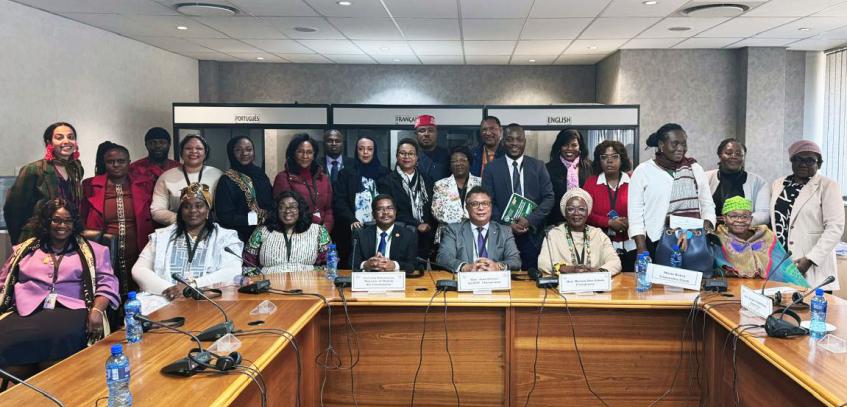The Pan-African Parliament Committee on Health, Labour, and Social Affairs, in collaboration with the Committee on Gender, Family, Youth, and People with Disabilities, discussed the importance of promoting traditional medicine in Africa. The discussions also focused on strengthening the scientific foundation of traditional medicine through research and innovation.
This working session was a follow-up to assess progress since the Plenary of the Parliament adopted a report by the Committee on Health in June 2023, calling for the promotion of traditional medicines in Africa with appropriate legal frameworks to regulate their trade. The Plenary also mandated the Committee to lead advocacy for increased public awareness of the benefits of African traditional medicines.
According to the World Health Organization (WHO), more than 80% of the world's population currently uses some form of traditional medicine, such as herbal and indigenous therapies. Despite this popularity, Africa still struggles to regulate and approve its herbal medicines for use.
Briefing the Permanent Committees of the Continental Parliament on the African Union (AU)'s initiatives to advance the traditional medicine agenda, Prof. Julio Rakotonirina, Director of Health and Humanitarian Affairs at the African Union Commission (AUC), emphasized that health is an integral priority of the AU’s flagship vision for the socio-economic transformation of the continent through Agenda 2063, "The Africa We Want." This vision cannot be achieved without ensuring access to safe, effective, and quality medicines, including traditional medicines.
He further noted that the African Health Strategy (2016-2030) is the overarching strategic document that envisions health for all, which can be fully achieved through coordinated and inclusive approaches. The strategy aims to strengthen health systems and recognizes, among other things, the need to ensure commodity security and a supportive regulatory environment for the provision of quality medicines and technologies, including nurturing traditional African medicine.
“We cannot speak of universal medicinal issues when we have them in our communities with just primary health care. It’s imperative that we, who work at the parliamentary level, enforce implementation. We must capitalize on opportunities to strengthen traditional medicine in Africa,” said Professor Rakotonirina.
Pan-African Parliamentarians met following a groundbreaking move in April 2024 when the African Union (AU) established its first sub-regional network of traditional leaders in Southern Africa. These leaders are to be trained in scientific evidence-based methodologies for the prevention, treatment, and care of drug dependency to widen the reach of community interventions amid a growing challenge of substance use disorders on the continent, especially among youth, women, and children.
The Permanent Committees also heard presentations from the Africa Scientific Research and Innovation Council (ASRIC), the South African Department of Science and Technology, and Charité Europe/Afrique perspectives. The stakeholders emphasized the importance of the African continent rallying behind traditional medicine as it does with modern medicines from Western countries.
Speakers highlighted the potential of traditional medicine to curb unemployment, provide affordable healthcare, and promote healthy living, urging Parliamentarians to support its use. Dr. Hlupheka Chabalala, Director of the Department of Science and Innovation in South Africa, presented the strides the country has made in recognizing traditional medicine as a preferred treatment for illnesses. Dr. Chabalala mentioned that they are working with traditional doctors across the continent to research and identify plants for medicinal purposes. ASRIC Senior Scientific Officer Dr. Mohammed Kyara highlighted that the use of African plants and herbs helped combat COVID-19. Dr. Kyara stated that the quality of plants found in Africa proves that the continent has the potential to manufacture and regulate its own medicines.
Echoing, the MPs applauded the countries that have started promoting traditional medicine and building manufacturing companies on the continent. They agreed that, as Parliamentarians, they need to support and promote traditional medicine.
The Members also expressed concern over the lack of support from Africans for their own products due to stigma, particularly regarding traditional medicine. The MPs resolved that African countries should work together to create more awareness about traditional medicine. They also emphasized the need for legislation to regulate and adopt the use of traditional medicine.
These discussions took place during the ongoing 3rd Ordinary Session of the Sixth Parliament of the Pan-African Parliament in Midrand, South Africa, under the African Union’s (AU) Theme of the Year focusing on Education.








